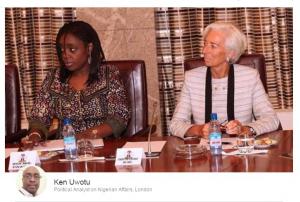IMF Chief Christine Largarde’s devaluation proposal flawed but Nigeria's economy could be in serious trouble.
Nigeria's foreign reserves are feeling pain of both its reliance on oil for forex inflows and its attempts to arrest the slide in the Naira as oil prices tumble
The fall in oil price has created some challenges for the government with the country's budget deficit expected to double1 to 2.2 trillion naira ($11bn, £7.4bn) this year. In a reaction to the global oil crisis President Muhammadu Buhari has stated his government would seek funding overseas of 900bn naira as well as 984bn naira domestically in an attempt to plug gaps in the budget.
The International Monetary Fund (IMF) Managing Director, Mrs. Christine Largarde on her recent visit to Nigeria stated “The economy is well diversified; it is no longer dominated by agriculture and oil with services accounting for almost half of Gross Domestic Product (GDP), including a significant home-grown film industry and innovative start-ups from fashion to software development”. Mrs. Christine Largarde's view on Nigeria's economic diversification is misleading and can at best be described as a 'cosmetic assessment' in terms of revenue generation. The Nigerian government has failed to generate taxes from agriculture and services industries and according to the World Bank, Nigeria’s tax revenue is one of the lowest in the world today. Some would argue true diversification is measured by a country’s export volumes and the overall contributions of export revenue to a nation’s foreign reserves. Nigeria derives 90% of its foreign exchange from crude oil while all other sectors collectively contribute just 10%.
The IMF has helped out a number of African nations in difficult times, it approved a $918 million bailout package for Ghana in April 2015 to restore debt sustainability and macroeconomic stability but it hasn’t always been a beacon of support in Africa; the IMF backed a structural adjustment program in Nigeria which failed to address a number of economic problems. Instead, external debt swelled, the fiscal gap widened and economic growth became far-fetched. It is therefore prudent for the Minister of Finance, Mrs Kemi Adeosun and the Nigerian government to take on board advice offered by international financial organisations but the Minister must review both the macroeconomic and microeconomic factors that affect Nigeria's economy before deciding on a fiscal policy and strategy to tackle the challenges facing the economy.
Currency devaluation is intended to make exports become cheaper and more competitive to foreign buyers thereby providing a boost for domestic demand; higher level of exports should lead to an improvement in the current account deficit however, the devaluation of Nigeria's currency, the Naira may fail to deliver these benefits because revenue generated from Nigeria's exports is currently in decline with non-oil exports dropping significantly from $664 million in the second quarter of 2014 to $391 million during the corresponding period of 2015.
The Nigerian government favours forex restriction over the devaluation of the Naira but the government may be forced to officially devalue the Naira if the price of oil continues to fall and the Central Bank of Nigeria can no longer justify using the country's fast depleting foreign reserves ($29.13 billion as of 29/12/2015) to continue propping up the Naira. The present restrictions on the autonomous foreign exchange market by the government should only be considered as a temporary measure as this approach may significantly affect Nigeria’s already dwindling export earnings.
The Oil Petroleum Exporting Countries (OPEC) lead by Saudi Arabia is desperately trying to recover market shares from US Shale oil producers; this battle for dominance in the oil market has led to the drastic drop in oil prices. Africa's biggest economy Nigeria could be heading into uncharted territory as the price of oil has now dropped to $30.98/barrel, a price less than Nigeria's total cost of oil production at $31.6/barrel (source - OPEC). The national budget recently submitted to the Nigerian parliament by President Buhari is based on an oil price benchmark of $38 per barrel.
Nigeria's budget shortfall of $11 billion has forced the government to source for emergency loans totaling $3.5 billion from the World Bank and the African Development Bank. The IMF and World Bank have long been advocates for the devaluation of the Naira and are mostly likely ask Nigeria to officially devalue its currency as a prerequisite for any emergency loans. Mrs. Kemi Adeosun, Nigeria's Finance Minister further clarified the government’s position on the issue of emergency loans; she states the government seeks loans at "concessionary rates" as low as 1.5 percent from international agencies to fund infrastructure projects before returning to the eurobond market. The Nigerian government is now in exploratory talks with China Exim Bank for a possible loan.
The Nigerian government is likely to stand firm on its policy of attempting to spend its way out of its current economic crisis. The government intends to borrow money in the form of loans to try and plug the financial gaps in the 2016 budget with the hope oil prices will return to 'profitable levels' for the country in the near future however with the demand for oil in China slowing down and Iran set to pump 500,000 additional barrels of oil into the market a day, it is unlike oil prices will rise significantly in the short to medium term.
Download this article here...2
For more information about author3
Ken Uwotu
Political Analyst on Nigerian Affairs, London
+447506880473
email us here

1 http://www.bbc.co.uk/news/business-35162111
2 http://www.cqc-ratings.org.uk/NairaDevaluation.pdf
3 https://uk.linkedin.com/in/kenuwotu

